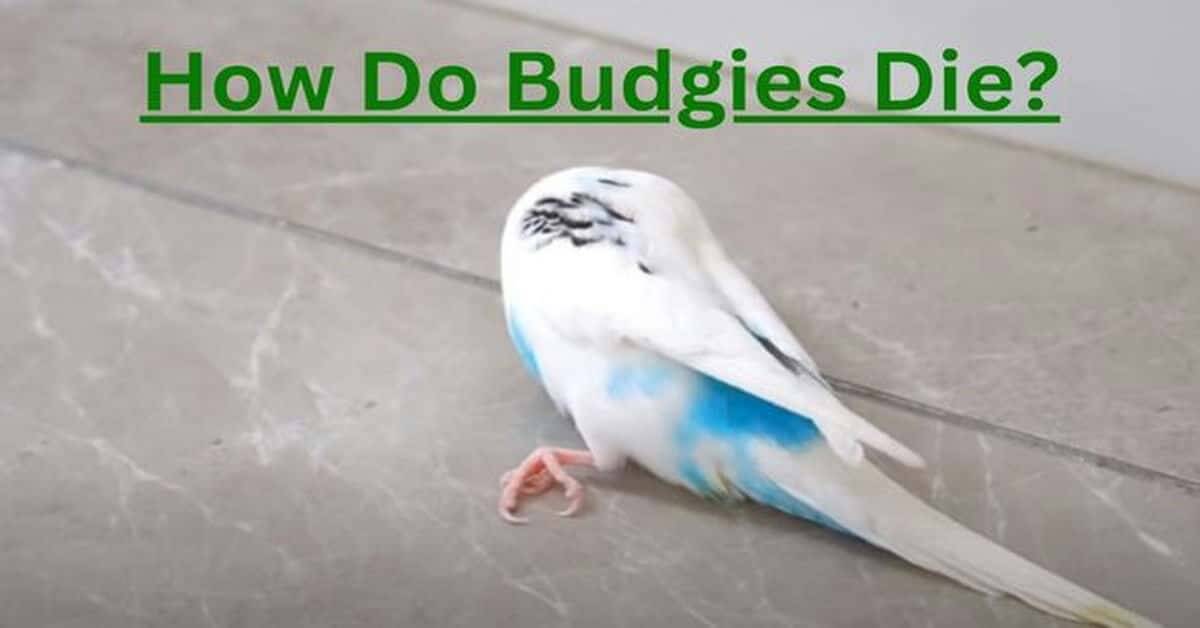How Do Budgies Die?
Budgies can die from illness, poor diet, injury, extreme temperatures, stress, or toxic substances. Regular care helps prevent early death.
Hey, are you worried about your budgie’s health? It’s super important for bird lovers to know why budgies and how budgies die. There are lots of reasons, from getting sick to having accidents.
Good news, though. In this blog, I’m sharing why budgies are dying too soon. Knowing this helps us take better care of our winged pals, ensuring they live long, joyful lives.
How Do Budgies Die?

Budgerigars, commonly known as budgies, are small and popular pet birds. However, like any living creature, they are not immune to illness or other factors that may lead to their unfortunate demise.
Here are some common reasons why budgies may pass away:
1. Age
Budgies have a typical lifespan of 5 to 10 years, although some can live longer with proper care. As budgies reach the end of their natural lifespan, they become more susceptible to age-related health issues, and their organs may start to fail over time.
2. Common Health Issues
Budgies are charming and delicate birds. They need proper care to stay healthy, and understanding common health issues helps ensure their well-being.
Respiratory Infections
Budgies are prone to respiratory infections and can easily catch colds. Symptoms include sneezing, coughing, and nasal discharge. They may also show labored breathing.
Causes of respiratory infections can be:
- Cold drafts
- Dusty environment
- Poor ventilation
Maintain a clean and warm habitat. This helps prevent respiratory issues.
Digestive Problems
Digestive problems can also affect budgies. They may have diarrhea or vomiting. Poor diet is often the cause.
Common causes include:
- Spoiled food
- Overfeeding
- Sudden diet changes
Feed your budgie a balanced diet. Include fresh fruits and vegetables. Ensure fresh water is always available.
3. Accidental Injuries
Accidental injuries can kill budgies. These little birds are very active and can easily get into trouble. Owners need to be aware of potential dangers in their homes.
- Flying Accidents
Budgies love to fly. It’s their natural way to explore. But flying indoors can be dangerous. They might crash into windows or mirrors, which can cause serious injuries. To prevent this, cover mirrors and windows and use bird-safe materials to block dangerous areas.
- Predator Attacks
Predators pose a big threat to budgies. Cats and dogs can attack them. Even other birds can be a danger. It is essential to keep budgies in secure cages. Ensure the cage is strong and has no gaps. Always supervise them during playtime outside the cage. This helps to keep them safe from attacks.
4. Poor Nutrition
Inadequate or improper nutrition can lead to various health problems, including malnutrition, obesity, and vitamin deficiencies. A diet lacking essential nutrients can weaken a budgie’s immune system and make them more susceptible to illness.
5. Environmental Hazards
Budgies are curious and playful birds. Unfortunately, their environment can pose many dangers. Environmental hazards can lead to serious health issues and even death. This section will discuss some common threats that budgies face at home.
Toxic Plants
Many household plants are toxic to budgies. It is important to know which plants can harm your pet.
Here is a table of common toxic plants:
| Plant Name | Effects on Budgies |
|---|---|
| Philodendron | Causes vomiting and diarrhea |
| Pothos | Leads to difficulty breathing |
| Oleander | Can cause heart failure |
| Dieffenbachia | Causes swelling and pain |
Always keep these plants out of reach. Budgies can chew on leaves and get sick. Ensure your home is free of these toxic plants.
Household Chemicals
Many household chemicals are dangerous for budgies. Cleaners, sprays, and even perfumes can be harmful.
Here are some common items to avoid:
- Bleach
- Ammonia
- Air fresheners
- Pesticides
These substances can cause respiratory problems and poisoning. Always use bird-safe products around your budgie.
Store chemicals in closed cabinets. Ensure ventilation when using any cleaning agents. Never spray chemicals near your budgie’s cage.
6. Stress Factors
Budgies are delicate creatures. Stress can lead to their untimely death. Understanding the stress factors is crucial for their well-being. Let’s delve into some common stress factors that affect budgies.
- Loud Noises
Budgies have sensitive hearing. Loud noises can cause immense stress. Thunderstorms, construction work, and loud music are common noise stressors.
- Thunderstorms
- Construction noise
- Loud music
These sounds can scare your budgie. Prolonged exposure can lead to heart problems.
- Overcrowded Cages
Budgies need space to move freely. Overcrowded cages can cause stress and anxiety. They may fight for space and resources.
| Number of Budgies | Recommended Cage Size |
|---|---|
| 1-2 Budgies | 18x18x24 inches |
| 3-4 Budgies | 30x18x36 inches |
Ensure your cage is spacious. This helps reduce stress and promotes a healthy life.
7. Genetic Disorders
Genetic disorders can significantly impact budgies’ lifespans. These disorders often result from inherited conditions or breeding practices that prioritise certain traits over health. Understanding these factors can help budgie owners take better care of their pets.
- Inherited Conditions
Many budgies suffer from inherited conditions due to genetic mutations. These conditions include feather diseases, liver problems, and heart defects. Some budgies are born with weak immune systems, making them prone to infections.
Inherited conditions like Feather Duster Syndrome cause abnormal feather growth. Budgies with this condition often have a shorter lifespan. Another common inherited disorder is French Molt. This condition leads to feather loss and can make flying difficult.
- Breeding Practices
Breeding practices play a crucial role in budgies’ health. Selective breeding for specific traits can lead to genetic disorders. Breeders often prioritize appearance over health, increasing the risk of inherited conditions.
Some breeders focus on producing rare colors or patterns, which can result in a limited gene pool and cause genetic issues. Ethical breeding practices aim to reduce these risks by ensuring genetic diversity.
Breeders should conduct health checks and avoid breeding budgies with known genetic disorders. This practice helps produce healthier offspring and reduces the occurrence of genetic disorders.
8. Parasites
If left untreated, internal and external parasites, such as mites and worms, can harm a budgie’s health.
To control parasites in budgies, maintain a clean cage, change bedding often, and quarantine new birds. Ensure a nutritious diet to boost the immune system.
Consult a vet for specific treatments and regular check-ups to detect and address parasites promptly if infestation is suspected.
9. Overbreeding
In breeding situations, female budgies can become stressed or physically weakened from frequent egg-laying, leading to health problems and, in severe cases, death.
10. Overheating
Budgies are sensitive to temperature extremes. Overheating for budgies typically occurs when temperatures exceed 85-90 degrees Fahrenheit (29-32 degrees Celsius). High temperatures can lead to heat stress or heatstroke.
However, providing shade, fresh water, and proper ventilation during hot weather is crucial to keep budgies cool. Avoid exposing them to direct sunlight, and consider using fans or air conditioning to maintain a comfortable temperature in their environment.
Ultimately, it’s crucial to provide your budgie with a healthy diet, a clean and safe living environment, regular veterinary check-ups, and attention to their physical and emotional needs to help prevent or address many of these potential causes of death.
If you suspect your budgie is ill or in distress, seek immediate veterinary care to give them the best chance of recovery.
Symptoms Of A Dying Budgie

Budgies are delicate birds. Recognizing signs of illness early can save their lives. Understanding these signs helps provide timely care.
1. Behavioral Changes
Behavioral changes are crucial indicators of a budgie’s health.
- Lethargy: A sick budgie may sit quietly for long periods.
- Appetite Loss: Notice if your budgie eats less or ignores food.
- Unusual Vocalizations: Listen for changes in chirping or singing patterns.
- Isolation: A sick budgie may avoid social interactions.
- Plucking Feathers: Excessive feather plucking can indicate stress or illness.
2. Physical Symptoms
Physical symptoms provide visible evidence of a budgie’s health issues.
| Symptom | Description |
|---|---|
| Weight Loss | Rapid weight loss can be a severe health issue. |
| Discharge | Check for discharge from eyes, nose, or beak. |
| Swelling | Look for swelling in the abdomen or joints. |
| Fluffed Feathers | Constantly fluffed feathers can indicate illness. |
| Breathing Issues | Watch for labored or noisy breathing. |
Quick action on these symptoms can help your budgie recover.
Prevention Tips
Preventing your budgie’s untimely death involves several essential steps. Taking care of your budgie’s health can extend its life. Below are some prevention tips to keep your budgie healthy and happy.
Balanced Diet
A balanced diet is crucial for your budgie’s health. Feed your budgie a mix of seeds, fruits, and vegetables. Seeds alone do not provide complete nutrition. Include fresh fruits like apples and berries in small amounts.
Vegetables like spinach and carrots are also good choices. Avoid feeding your budgie avocado as it is toxic. Provide clean, fresh water daily. A vitamin supplement can also be beneficial.
| Food Type | Examples |
|---|---|
| Fruits | Apples, Berries |
| Vegetables | Spinach, Carrots |
| Avoid | Avocado |
Safe Environment
A safe environment prevents accidents and injuries. Ensure the cage is spacious and clean. Remove any sharp objects from the cage. Place the cage away from direct sunlight and drafts.
Keep the environment stress-free. Loud noises can scare your budgie. Provide toys to keep them engaged. Rotate toys to prevent boredom. Regularly check for any signs of illness.
- Spacious and clean cage
- Remove sharp objects
- Avoid direct sunlight
- Stress-free environment
- Provide toys
Following these tips can create a safe and healthy space for your budgie.
Why Do Budgies Die Suddenly?
Sudden death in budgies is often caused by exposure to airborne toxins. While humans may not find certain fumes harmful, these substances can be highly toxic to birds.
Common culprits include household cleaners, pesticides, scented candles, and certain types of incense. Budgies are highly susceptible to these toxins, and even a small amount can be fatal.
If you suspect your budgie may have been exposed to a harmful substance and is showing signs of sudden illness or distress, it is crucial to seek immediate veterinary care.
Remember to provide a safe environment for your budgie by avoiding harmful substances and ensuring proper ventilation in their living space.
While losing a budgie can be heart-wrenching, it is vital to allow yourself and any remaining budgie time to grieve. With patience, attention, and possibly adding a new mate, budgies can heal and continue to thrive.
Please note that this article is for informational purposes only and does not substitute professional veterinary advice. If you have concerns about your budgie’s health, consult a qualified avian veterinarian.
What Should I Do If My Budgie Died?

Losing a beloved budgie can be a heartbreaking experience. Knowing how to handle the situation carefully is essential when your budgie dies.
Here are some steps you can take to cope with the loss:
- Give yourself time to grieve: Losing a pet can be devastating, and allowing time to process your emotions is essential. Permit yourself to grieve, and don’t rush the healing process.
- Properly handle the body: When your budgie passes away, it’s essential to handle their body carefully. Use gloves or tissue paper to pick up the budgie’s body and place it in a small box or container. You may want to consider burying your budgie or having them cremated.
- Create a farewell ritual: Saying goodbye to your budgie can help bring closure. Consider holding a simple ceremony or performing a ritual that holds meaning for you. This can help you honor their memory and provide the opportunity for closure.
- Seek support: Feeling a sense of loss and sadness is normal after your budgie’s passing. Reach out to friends, family, or support groups who can provide understanding and comfort during this difficult time.
- Consider getting a new budgie: While it’s natural to feel a void after losing a pet, it’s essential to give yourself time to heal before considering getting another budgie. When the time feels right, you may open your heart to a new feathered friend.
Losing a budgie can be a challenging experience, but with time and support, you can heal and cherish the memories you shared with your beloved bird. Remember to give yourself the space to grieve and care for your emotional well-being during this time.
Can A Dying Budgie Be Saved?

Saving a dying budgie is possible in some cases. Still, it depends on several factors, including the condition’s cause, the extent of the illness, and how quickly you seek professional help.
If you suspect your budgie is dying or in distress, here are some steps to consider:
1. Seek Veterinary Care
The most crucial step is to contact an avian veterinarian immediately. They are trained to diagnose and treat birds and can provide the best advice and treatment options for your budgie’s specific situation.
2. Provide Supportive Care
While waiting for the vet appointment, keep your budgie in a warm, quiet, and stress-free environment. Ensure it has access to fresh water and a comfortable place to rest.
3. Observe and Document
Pay close attention to your budgie’s symptoms and behaviors. Note any changes or worsening of its condition. However, this information will be helpful for the veterinarian.
4. Follow Veterinary Advice
Once you consult with the veterinarian, follow their instructions diligently. They may recommend medication, dietary changes, or other treatments based on their assessment.
5. Be Prepared
Unfortunately, not all budgies can be saved, especially in advanced stages of illness. In such cases, it’s essential to prepare emotionally for the possibility of loss.
Ultimately, the chances of saving a dying budgie depend on the veterinarian’s specific circumstances and expertise. However, it’s crucial to act quickly and seek professional help to give your budgie the best possible chance of recovery.
Frequently Asked Questions On How Do Budgies Die
Here are some frequently asked questions related to the topic of how budgies may die, along with brief answers:
How long do budgies typically live?
What are common causes of budgie deaths?
Do budgies die of old age?
If a budgie reaches 7 years or older, it is generally considered to be in its old age. Budgies at this stage may experience more health issues associated with aging, and their longevity may vary depending on their overall health.
Can budgies die from loneliness?
How can I prevent my budgie from dying prematurely?
Sum Up
So, budgies can leave us for all sorts of reasons – getting sick, hurt, eating badly, too much stress, not enough water, poison, or even because their parents were too closely related. They need good stuff like sunlight, fresh air, clean water, and the right food to keep them chirping happily.
But, hey, paying close attention to them and spotting when something’s off is super important. Budgies can sometimes go quickly without warning. Knowing what might go wrong helps us do our best to avoid it, making sure our feathered friends stick around, happy and healthy, for a long, long time.
At the very end of this, I have a little ask for you—if you found this helpful, could you share it around? It could really help someone else out. Thanks a bunch.







